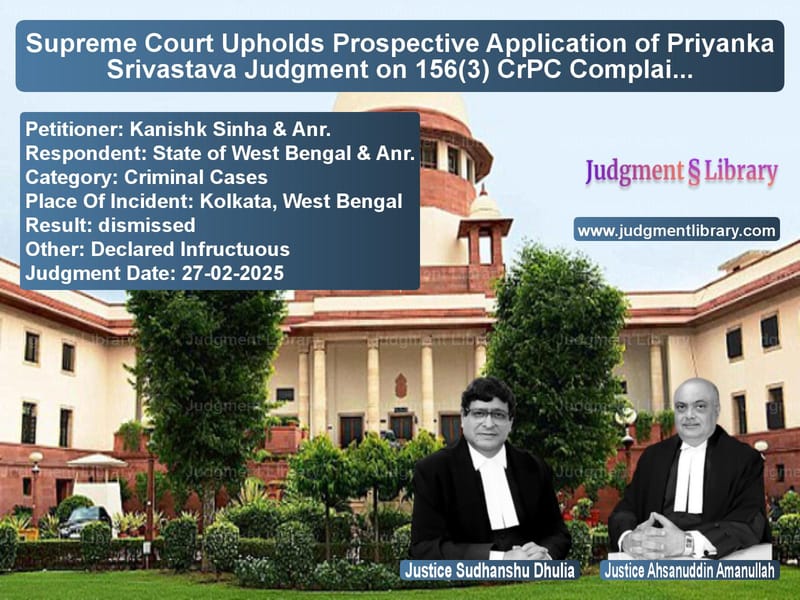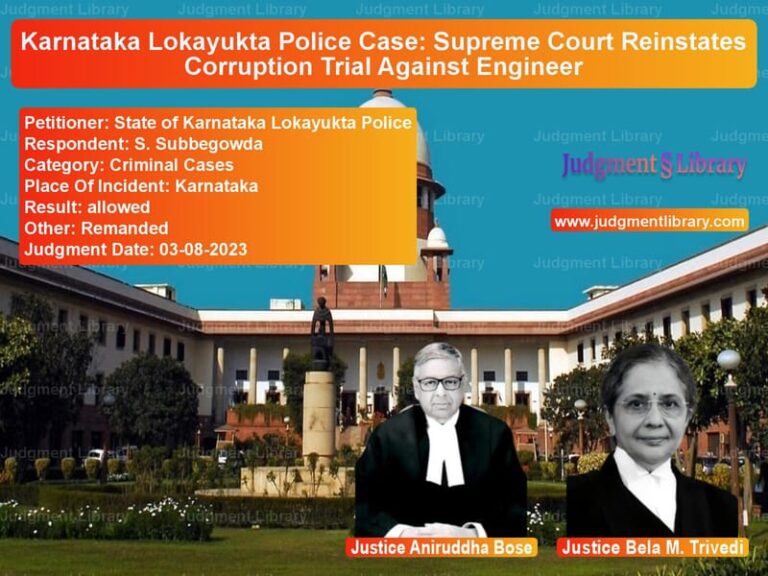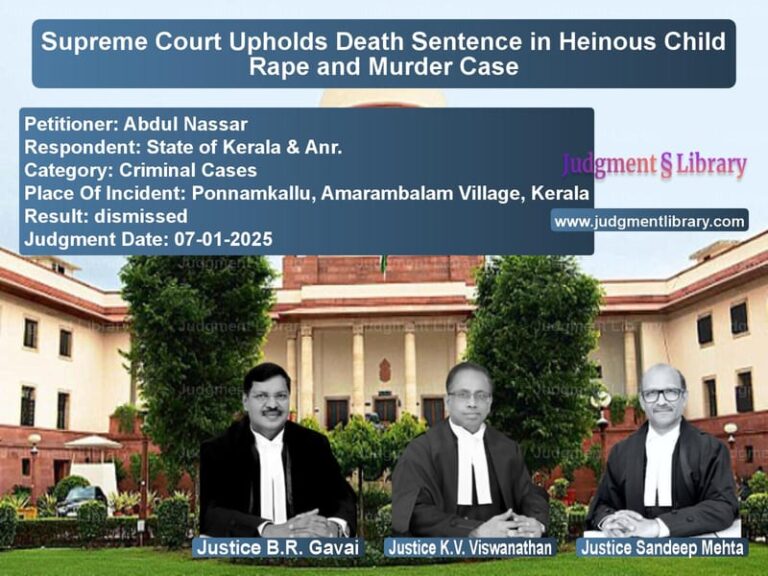Supreme Court Upholds Prospective Application of Priyanka Srivastava Judgment on 156(3) CrPC Complaints
The Supreme Court of India, in a recent judgment, has ruled that the requirement for affidavits to accompany complaints filed under Section 156(3) of the Criminal Procedure Code (CrPC), as laid down in Priyanka Srivastava v. State of Uttar Pradesh, will only apply prospectively and not retrospectively. This ruling provides clarity on procedural requirements for criminal complaints and prevents the invalidation of past complaints filed before the 2015 judgment.
Background of the Case
The appellants, Kanishk Sinha and his wife, challenged the validity of two FIRs registered against them in 2010 and 2011 at Bhowanipur Police Station, Kolkata. They argued that the complaints, which were filed before a magistrate under Section 156(3) CrPC, were not accompanied by an affidavit, violating the requirements set forth in the Priyanka Srivastava case.
They filed criminal revisions before the Calcutta High Court, seeking the quashing of the FIRs. The High Court rejected their plea, holding that the affidavit requirement in Priyanka Srivastava did not apply retrospectively. Aggrieved by this decision, the appellants approached the Supreme Court.
Key Legal Issues
- Whether the affidavit requirement prescribed in Priyanka Srivastava applies to complaints filed before the 2015 judgment.
- Whether the FIRs against the appellants should be quashed for non-compliance with the affidavit requirement.
- The general principle of retrospective and prospective application of judicial pronouncements.
Arguments by the Appellants
The appellants, who appeared in person, argued:
- The Priyanka Srivastava judgment applies retrospectively since all judicial pronouncements must be considered declaratory of the law.
- As the complaints leading to the FIRs were not accompanied by an affidavit, they were legally invalid and should be quashed.
- The High Court erred in holding that the judgment in Priyanka Srivastava was prospective in nature.
“The judgment of a Constitutional Court is retrospective in nature unless the court explicitly states otherwise.”
Arguments by the Respondents
The State of West Bengal countered:
- The affidavit requirement in Priyanka Srivastava was introduced to curb frivolous complaints and streamline the judicial process, not to invalidate past complaints.
- Applying the judgment retrospectively would lead to the quashing of thousands of genuine complaints filed before 2015, causing injustice.
- The High Court correctly held that the requirement is prospective, as explicitly indicated by the language used in the Priyanka Srivastava ruling.
“The directions in Priyanka Srivastava clearly indicate that they were meant for future cases to prevent misuse of Section 156(3) CrPC.”
Supreme Court’s Observations
The Supreme Court analyzed the issue and made the following key observations:
- The general rule is that legislative enactments operate prospectively, while judicial pronouncements are retrospective unless specified otherwise.
- The language in Priyanka Srivastava indicated that the affidavit requirement was introduced as a preventive measure for future cases, not to invalidate past complaints.
- Applying the requirement retrospectively would unsettle long-settled cases and lead to injustice.
- The High Court correctly interpreted the judgment and rejected the plea to quash the FIRs based on a procedural requirement introduced later.
“The judgment in Priyanka Srivastava was meant to prevent future misuse of Section 156(3) CrPC. Applying it retrospectively would be unjust and disruptive to the legal system.”
Final Judgment
The Supreme Court ruled:
“The requirement of affidavits in complaints under Section 156(3) CrPC, as mandated in Priyanka Srivastava v. State of Uttar Pradesh, is prospective and does not apply to complaints filed before the 2015 judgment. The appeals are dismissed.”
The Court also clarified that the appellants are at liberty to move for discharge if the charges have not yet been framed in the pending cases.
Impact of the Judgment
This ruling has significant implications:
- Confirms that procedural requirements introduced in judicial pronouncements are not automatically retrospective.
- Prevents the quashing of past FIRs based on new procedural mandates.
- Ensures that settled legal matters are not disrupted by subsequent changes in procedural law.
- Provides clarity on the application of Priyanka Srivastava to pending and future cases.
By upholding the prospective application of the affidavit requirement, the Supreme Court has reinforced the principle that changes in procedural law must be applied fairly and consistently, ensuring that past actions are not invalidated retrospectively.
Petitioner Name: Kanishk Sinha & Anr..Respondent Name: State of West Bengal & Anr..Judgment By: Justice Sudhanshu Dhulia, Justice Ahsanuddin Amanullah.Place Of Incident: Kolkata, West Bengal.Judgment Date: 27-02-2025.
Don’t miss out on the full details! Download the complete judgment in PDF format below and gain valuable insights instantly!
Download Judgment: kanishk-sinha-&-anr.-vs-state-of-west-bengal-supreme-court-of-india-judgment-dated-27-02-2025.pdf
Directly Download Judgment: Directly download this Judgment
See all petitions in Bail and Anticipatory Bail
See all petitions in Fraud and Forgery
See all petitions in Legal Malpractice
See all petitions in Judgment by Sudhanshu Dhulia
See all petitions in Judgment by Ahsanuddin Amanullah
See all petitions in dismissed
See all petitions in Declared Infructuous
See all petitions in supreme court of India judgments February 2025
See all petitions in 2025 judgments
See all posts in Criminal Cases Category
See all allowed petitions in Criminal Cases Category
See all Dismissed petitions in Criminal Cases Category
See all partially allowed petitions in Criminal Cases Category







